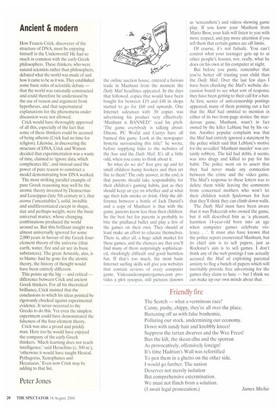Ancient & modern
How Francis Crick, discoverer of the structure of DNA, must be enjoying himself in the Underworld! He had so much in common with the early Greek philosophers. These thinkers, who were natural scientists rather than philosophers, debated what the world was made of and how it came to be as it was. They established some basic rules of scientific debate — that the world was rationally constructed and could therefore be understood by the use of reason and argument from hypotheses, and that supernatural explanations for the phenomena under discussion were not allowed.
Crick would have thoroughly approved of all this, especially of the fact that some of these thinkers could be accused of being atheists (Crick had no time for religion). Likewise, in discovering the structure of DNA, Crick and Watson decided that experimentation was a waste of time, claimed to 'ignore data, which complicates life', and instead used the power of pure reason to construct a model demonstrating how DNA worked. The most striking parallel example of pure Greek reasoning may well be the atomic theory invented by Democritus and Leucippus (late 5th century BC), that atoma ('uncuttables), solid, invisible and undifferentiated except in shape, size and perhaps weight, were the basic universal matter, whose changing combinations produced the world around us. But this brilliant insight was almost universally ignored for some 2,000 years in favour of the Greek fourelement theory of the universe (that earth, water, fire and air are its basic substances). The great Aristotle, alas, is to blame: had he gone for the atomic theory, the history of thought would have been entirely different.
This points up the big — and critical — difference between Crick and ancient Greek thinkers. For all his theoretical brilliance, Crick insisted that the conclusions to which his ideas pointed be rigorously checked against experimental evidence. It never occurred to the Greeks to do this. Yet even the simplest experiment could have demonstrated the falseness of the four-element theory. Crick was also a proud and prickly man, Here too he would have enjoyed the company of the early Greek thinkers. 'Much learning does not teach intelligence,' said Heraelitus (c. 500 Bc), 'otherwise it would have taught Hesiod, Pythagoras, Xenophanes and Hecataeus.' Even now Crick may be adding to that list.
Peter Jones


























































 Previous page
Previous page